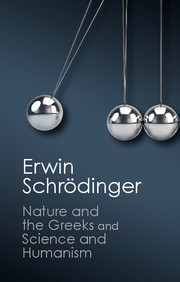Book contents
- Frontmatter
- Contents
- Foreword
- NATURE AND THE GREEKS
- SCIENCE AND HUMANISM
- Dedication
- Preface
- The spiritual bearing of science on life
- The practical achievements of science tending to obliterate its true import
- A radical change in our ideas of matter
- Form, not substance, the fundamental concept
- The nature of our ‘models’
- Continuous description and causality
- The intricacy of the continuum
- The makeshift of wave mechanics
- The alleged break-down of the barrier between subject and object
- Atoms or quanta-the counter-spell of old standing, to escape the intricacy of the continuum
- Would physical indeterminacy give free will a chance?
- The barto prediction, according to Niels Bohr
A radical change in our ideas of matter
Published online by Cambridge University Press: 05 October 2014
- Frontmatter
- Contents
- Foreword
- NATURE AND THE GREEKS
- SCIENCE AND HUMANISM
- Dedication
- Preface
- The spiritual bearing of science on life
- The practical achievements of science tending to obliterate its true import
- A radical change in our ideas of matter
- Form, not substance, the fundamental concept
- The nature of our ‘models’
- Continuous description and causality
- The intricacy of the continuum
- The makeshift of wave mechanics
- The alleged break-down of the barrier between subject and object
- Atoms or quanta-the counter-spell of old standing, to escape the intricacy of the continuum
- Would physical indeterminacy give free will a chance?
- The barto prediction, according to Niels Bohr
Summary
We shall now, at last, come down to some special topics. What I have said hitherto may seem pretty long, if you consider it a mere introduction. But I hope it is of some interest in itself—and I could not avoid it. I had to make clear the situation. None of the new discoveries about which I may tell you is frightfully exciting in itself. What is exciting, novel, revolutionary, is the general attitude we are compelled to adopt on any attempt to synthesize them all.
Let us go in medias res. There is the problem of matter. What is matter? How are we to picture matter in our mind?
The first form of the question is ludicrous. (How should we say what matter is—or, if it comes to that, what electricity is—both being phenomena given to us once only?) The second form already betrays the whole change of attitude: matter is an image in our mind—mind is thus prior to matter (notwith-standing the strange empirical dependence of my mental processes on the physical data of a certain portion of matter, viz. my brain).
During the second half of the nineteenth century matter seemed to be the permanent thing to which we could cling.
- Type
- Chapter
- Information
- 'Nature and the Greeks' and 'Science and Humanism' , pp. 115 - 122Publisher: Cambridge University PressPrint publication year: 2014



